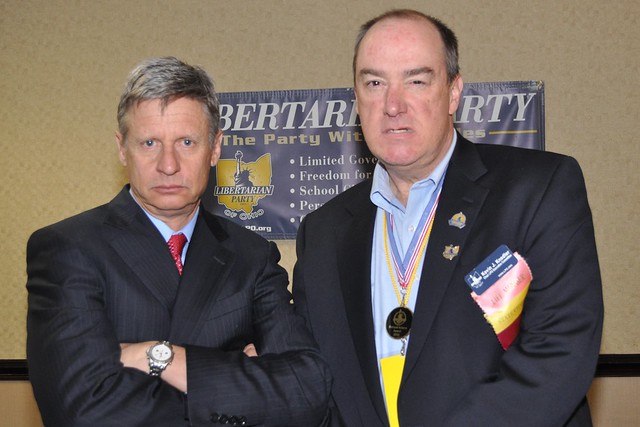No, America Doesn't "Need" a Third Party
/This past week, third party candidates Gary Johnson and Jill Stein officially failed to meet the 15-percent polling threshold to earn an invitation to the first 2016 presidential debate. Johnson has consistently polled at around eight percent, with Stein pulling another point or so. While these numbers will leave the pair at home on September 26, if they hold up through the election Johnson and the Libertarians will see the best third-party showing since Ross Perot’s Reform Party in the 1990s.
This isn’t the first presidential campaign for either Johnson or Stein. Both candidates ran in 2012, earning 0.99% and 0.36% of the vote respectively. It’s no mystery why the two are polling much better in 2016. The Republicans and Democrats have nominated historically unpopular candidates, and trust in the two major parties has cratered over the last decade. At times, Johnson has even edged Donald Trump for the second-place spot in polling among the youngest voters.
Popular support for Johnson and Stein shouldn’t be overstated – 90% of voters are backing the two major parties, and this is unlikely to change come November. Still, in 2016 there is loud, small but growing cohort who feels that American politics needs to be revitalized with a viable third party.
I have never understood this urgency.
Read any column or social media post about the need for a third party in American politics, and you’ll tend to see the same patterns. Mark Schmitt of Vox made the case just a few days ago. Schmitt laments partisan gridlock, and hopes that “[a]dditional parties . . . could open up Congress and create new opportunities for bargaining and coalition building on unusual lines.” At Salon, a blogger writes of major parties “[c]ontrolled by the corporate class,” that have “become incapable of compromise.” Head to the Facebook or Twitter profiles of disillusioned Bernie-or-Busters or Never-Trumpers, and you’ll see the same thoughts put more crudely: don’t listen to the corporate media forcing a binary choice, we need a third party alternative to the corrupt, untrustworthy, corporate-funded establishment that exists just to line their own pockets.
To me, the calls for a third party feel almost faith-based. I have yet to see a convincing argument as to how supporting a third party will actually solve any of the problems people see in American politics.
First, let’s make clear that the two-party system is not the result of any conspiracy by Democrats, Republicans or the media. A duopoly of two national parties, for whatever reason, is our country’s equilibrium. On the rare occasions since 1789 when a third party has gained traction, it has either quickly died out or completely supplanted one of the existing parties, returning the number to two. It is unclear exactly why our system invariably defaults to two parties. Political theorists often cite a rule of thumb known as Duverger's law, which holds that a first-past-the-post voting system with single-member districts will trend towards two major parties – a convincing theory that unfortunately fails to explain why similar political systems outside the United States, such as in India and the United Kingdom, have multiple national parties. Regardless of the precise mechanism, the fact that the United States has supported only two major parties for nearly the entirety of its existence is strong proof that the pattern results from the basic structure of our republican system, and any success in boosting a third party would prove to be short-lived.
Yet even if a third party were to sustain itself, I’ve never seen an explanation for why it would be more virtuous or effective than the major parties. There’s a tendency to forget that the negatives that people associate with American politics aren’t unique to the Democrats and Republicans. Millennia ago, Plato commented that, “[t]hose who are too smart to engage in politics are punished by being governed by those who are dumber.” Writing in the 19th century, Alexis de Tocqueville said, “There are many men of principle in both parties in America, but there is no party of principle.” (These two parties would have been the Democrats and Whigs.) In the past, newly-minted third parties hardly took long to resemble to become compromised politicians. In the mid-19th century, for instance, the Whig party fractured on the issue of slavery, and the Republican Party rocketed to power on an abolitionist platform. Within two presidencies, Ulysses S. Grant presided over a Republican administration continually beset with corruption scandals. Trust in government institutions may be low, but there was hardly a time in American history when politicians were not popularly stereotyped as greedy, vain and ambitious.
This would be true of any third party that rose to power. If outsider parties today are seen as uncompromised and virtuous, it is only because their lack of power frees them from the normal corrupting forces of political influence and the stain of making the ideological compromises necessary to govern. Make the Libertarians a strong political force, and see how long the party takes to attract self-serving, ambitious politicians who seek out corporate contributions and retire to K Street. Give the Greens a seat in the White House and a minority in Congress, and see how long they can hold off compromising their ideals before they have to work with conservatives to negotiate a budget.
Indeed, multi-party systems are generally the norm in the developed world, and yet these governments rarely provide more satisfaction to their constituents than Washington provides to us at home. As you may recall, a third party just engineered the United Kingdom's exit from the European Union on the back of anti-immigrant xenophobia, and virtually every European nation has done worse than the United States in navigating the 2008 financial crisis. Trust in government has collapsed globally, and often more severely than in the United States. According to a global survey by marketing firm Edelman, 39% of Americans generally trust the government as an institution, a figure equal to or higher than that for every G7 nation except Canada – all of which (besides the U.S.) have multi-party systems.
Beyond corruption and effectiveness, advocates often point to the lack of choice in American elections as a reason why a third party would be beneficial. Individual citizens vary greatly on multiple political dimensions, and few of us slot neatly into the Republican or Democratic platforms. Yet it’s not as if a multifaceted electorate that cannot be fully expressed in two choices would somehow be captured with just three or four boxes. Quite often, the presence of third parties allows extremists to gain a national stage; while the United States has kept its white nationalist politicians largely bottled up within the larger Republican Party, France has the National Front nakedly peddling jingoism and xenophobia. (Though Republicans this cycle are racing them to the bottom.) Indeed, the clearest cleavages in 2016 America are, on the right, the break between economic conservatism and racial resentment as the animating concern, and on the left between traditional liberals and those harboring a general distrust of the “establishment.” In the former case, the creation of a fully expressed white nationalist party would be horrifying, and in the latter, the inchoate demands of anti-establishment anxiety hardly seem capable of sustaining a lasting party – liberal defectors would probably return to the fold once the Democrats are led by more personally amiable figureheads.
Finally, and most importantly, despite the grumbling in 2016 the two-party system has worked in America. Winston Churchill once remarked that “Democracy is the worst form of government, except for all the others.” Well, the two-party system may be terrible, but I'm having trouble seeing a system that's performed better. This country is the world’s longest-running liberal republic. We progressed from a handful of colonies to become the strongest, richest, and most influential society in the history of mankind. We are the linchpin of the 21st century global order. Sure, the country has some glaring faults and atrocities on its conscience, our development was helped by our control over a giant territory filled with natural resources, and our population has been continually revitalized by periodic waves of immigration. But regardless, there is no other governmental system in the world with America’s centuries-long track record of sustained development and growth.
We should therefore reject the knee-jerk assertion that the United States “needs” a third party. There will always be problems to improve in our politics, but the call for a multi-party system is nothing more than grass-is-greener wishful thinking.

